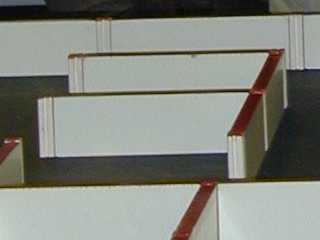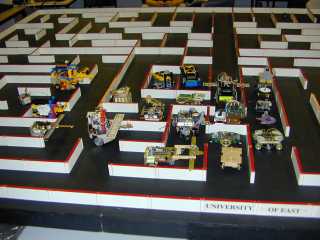The maze used for micromouse is described in the rules. For (my) convenience, I have reproduced the maze description from the IEE rules. I have seen no significant local variation from this description for other micromouse competitions.
- The maze shall be a 16 x 16 square array of 180 mm x 180 mm unit squares.
- The walls constituting the maze shall be 50 mm high and 12 mm thick.
- Passageways between the walls shall be 168 mm wide.
- The outside wall shall enclose the entire maze.
- The sides of the maze shall be white, and the top of the walls shall be red.
- The floor of the maze shall be made of wood and finished with a non-gloss black paint.
- The coating on the top and sides of the walls shall be selected to reflect infrared light and the coating on the floor shall absorb it.
- The start of the maze shall be located at one of the four corners.
- The starting square shall have walls on three sides.
- The starting square orientation shall be such that when the open wall is to the "North", outside maze walls shall be on the "West" and "South".
- At the centre of the maze shall be a large opening which is composed of 4 unit squares. This central square shall be the destination.
- A red post, 200 mm high and 25 mm on each side may be placed at the centre of the large destination square if requested by the handler.
- Small square posts, each 12 mm x 12 mm x 50 mm high, at the four corners of each unit are called lattice points.
- The maze shall be constituted such that there is at least one wall touching each lattice point, except for the destination square.
- The dimensions of the maze shall be accurate to within 5% or 20 mm, whichever is less.
- Assembly joints on the maze floor shall not involve steps of greater than 0.5mm.
- The change in slope at an assembly joint shall not be greater than 4 degrees.
- Gaps between the walls of adjacent squares shall not be greater than 1mm.
Here is a picture of a small section of maze used at MINOS’01 showing something of the way it is constructed:

